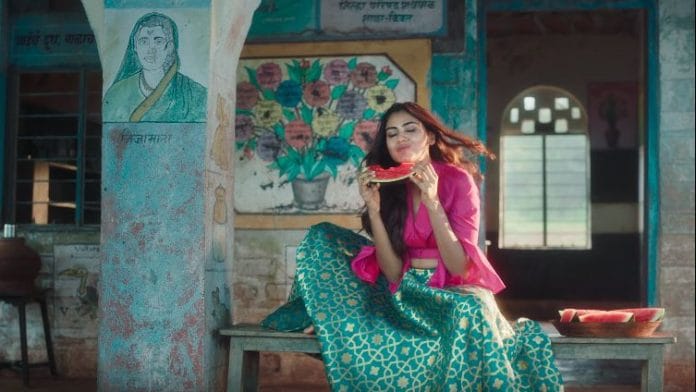New Delhi: Picture this: A group of women decked in Banarasi sarees, running through mustard fields and other similarly picturesque backdrops. Several close ups of the colourful garments are thrown in with more close ups of the women. Sounds like a fashion campaign, right? A few seconds later, the frame moves to a rather sensual shot of the women eating fruits. Then, this sentence emerges: “1 out of 2 women in India suffer from anemia. This Dhanteras, don’t just invest in Gold, invest in your iron.”
What now?
Turns out, this is not a saree ad but a social media campaign by Dutch multinational Dutch State Mines that specialises in science-based solutions in health, nutrition and sustainable living. The campaign is part of a CSR initiative called Project Streedhan which aims to raise awareness about the lack of iron causing anemia in women. As per the National Family Health Survey statistics, every second woman in India is anaemic and one in every five maternal deaths is directly due to anaemia.
According to a WHO report, 38% (32.4 million) of pregnant women aged 15-49 years were anaemic in 2011.
The campaign in itself garnered positive reactions and included endorsements from actors Vidya Balan, Dia Mirza and Soha Ali Khan. However, people on Twitter found the aesthetics rather jarring given the focus was women’s health.
Some pointed to how the campaign could set a new precedent for fashion brands — to promote both key issues and their brand. One could even call this ‘femvertising’ — advertising female empowerment, but women and others were divided on the issue.
More than half of India's women are anemic. Creative messaging for all women to invest in their most valuable asset – their health !!
Cheers to those who developed this ad campaign #InvestInIron #ProjectStreedhan https://t.co/9i5l9cJBI1
— Preetha Prabhakaran (@preeprabhakaran) October 21, 2019
Nicely done. #ProjectStreedhan
Who's the agency?https://t.co/ISPCfpu4Lr
— Shweta Mulki (@ShwetaMulki) October 21, 2019
Others said the ad was problematic for the way it sexualised women, and diverted attention away from the message.
”Anemia is a very real survival problem. It cannot be equated with gold,” said 24-year-old Shraddha, a researcher from IIM Ahmedabad, and questioned the logic of choosing Dhanteras as the time to launch the campaign.
“Women don’t choose to not eat iron-rich food, it is a much deeper problem that needs as much state intervention as behavioural change. To show women eating ‘iron-rich fruits’ in a rather teasing and erotic manner just makes it meaningless. It might as well have been a fruit drink or a deodorant advertisement,” she said.
This Project Streedhan video is going massively viral in almost all the WhatsApp Groups I'm part of. It wins spectacularly in terms of timing (Dhanteras) & aesthetics. But it doesn’t seem to be doing justice to the problem it is trying to addressing: https://t.co/y0tuYlOWvj pic.twitter.com/MRgM1nN2hD
— Karthik (@beastoftraal) October 23, 2019
Subverting with sexualization itself feels so-not-done to me. Also, the ad shows the 'ideal' bodies of 'desirable' age. Could've captured all ages, no?
Adolescents and pregnant women must be feeling so left out.
— Payal S (@payal_shawarma) October 22, 2019
This isn’t the first time an ad aimed at women empowerment has drawn some flak for falling into the same trap its trying to escape.
A recent Ponds ad shows a woman talk through her insecurities over her body — someone more curvaceous than her model-thin friends — only to reach for some make up to boost her confidence. While the message is clearly about body positivity, it uses other beauty standards to send it across.
Several Youtube users called the ad “toxic” for “body shaming women”.







My tweet is mentioned here. But it’s incomplete as I had added my take on the subversion in further comments. Please add that too